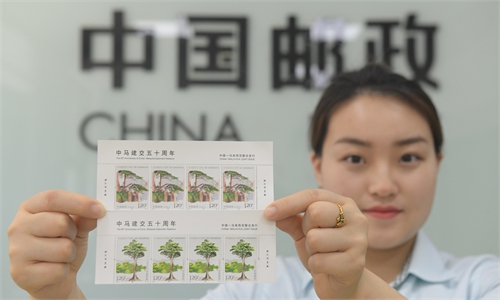Exclusive: Malaysia always advocates for China's active participation in regional dialogue, economic cooperation: envoy

Unny Sankar Ravi Sankar, minister of Economic Affairs of the Malaysian Embassy in Beijing Photo: Courtesy of Unny Sankar Ravi Sankar
Malaysia has consistently advocated for China's participation in regional dialogue and cooperation platforms. This was evident when China first proposed the Belt and Road Initiative (BRI), and Malaysia supported the policy and welcomed deeper cooperation among countries participating in the initiative, Unny Sankar Ravi Sankar, minister of Economic Affairs of the Malaysian Embassy in Beijing told the Global Times in an exclusive interview.
The remarks were made ahead of the visit by Chinese Premier Li Qiang to Malaysia starting on Tuesday, the third and last leg of his eight-day tour that has also taken him to New Zealand and Australia.
"Premier Li's official visit represents a significant opportunity to enhance the bilateral economic and trade relations between our two countries. We anticipate discussions on expanding trade, increasing mutual investment, and exploring new areas of deeper cooperation," Sankar said.
Strengthening the trade and economic partnership between the business communities of Malaysia and China is "imperative" as it can lead to more robust and resilient economic growth for both, Sankar noted.
This year, China and Malaysia celebrate the 50th anniversary of the establishment of their diplomatic ties. In this context, Sankar said that the expectation for stronger bilateral ties from both Malaysia and China is running high.
"If we reflect on the historical ties, we must recognize that Malaysia was among the early Southeast Asian nations to establish diplomatic relations with China on May 31,1974, and Malaysia was also a proponent country which supported China's inclusion in ASEAN Plus frameworks," the envoy said.
Economic and trade relations between China and Malaysia are highly complementary, and the perception of high complementarity between Malaysia and China is based on their mutually beneficial economic, trade, and investment relationships, Sankar said.
China has been Malaysia's largest trading partner for 15 consecutive years. In 2023, Malaysian statistics showed that 17.1 percent of Malaysia's global trade was done with China.
On the investment front, China regained the top position as the largest source of foreign direct investment in Malaysia in 2023, with realized investments amounting to $18.5 billion.
In addressing the high complementarity between the two countries, Sankar said that Malaysia's rich natural resources, advanced manufacturing capabilities, and strategic location align well with China's industrial and consumer demands.
"This complementarity allows both countries to benefit from increased trade efficiency, supply chain integration, and economic synergy," he noted.
The new economic policies announced by Malaysia including the New Industrial Masterplan (NIMP 2030) and the National Energy Transition Roadmap (NETR) provide a new impetus for the private sector players from Malaysia and China to tap potential in the new and emerging technologies, according to Sankar.
Malaysia invites foreign investors including those from China to collaborate with Malaysian manufacturers in new industries emphasized in NIMP 2030, such as the electric vehicle (EV) segment, advanced materials, specialty chemicals, medical devices, and advanced digital technology "that can increase our economic complexity and attract higher-skilled jobs," said Sankar.
Since Malaysia joined the Regional Comprehensive Economic Partnership (RCEP), which takes effect in March 2022, the country has derived huge benefits from the free trade deal that includes 15 countries.
Sankar in particular highlighted China's participation in the RCEP, which he said has been a pivotal development for Malaysian economy.
The RCEP offers numerous opportunities for businesses and investors in both countries while contributing to the overall economic stability and development of the Asia-Pacific region, he said.
Malaysia is one of the earliest countries to support and participate in the joint construction of the BRI, and has also benefited from multiple projects under the initiative.
In Sankar's view, Malaysia has reaped significant benefits from participating in the BRI, as the initiative has facilitated infrastructure development, improved connectivity, and attracted substantial Chinese foreign direct investment to Malaysia.
Malaysia is confident that BRI will open up new frontiers of connectivity, and new possibilities for growth and development across the Asia Pacific, Africa, and Central and Eastern Europe, Sankar said.
The flagship BRI projects between Malaysia and China, namely the Malaysia-China Kuantan Industrial Park (MCKIP) in Kuantan and China-Malaysia Qinzhou Industrial Park in Qinzhou developed under the "Two Countries, Twin Parks" concept is regarded as the model projects for BRI cooperation.
Today, MCKIP has become the engine of economic growth, especially in the East Coast Region of Malaysia and has yielded job opportunities for the locals, while at the same time formed a vital economic linkage between Malaysia, China and Southeast Asia, Sankar said.
BRI cooperation is important for Malaysia as it has the potential to enhance infrastructure construction, attract investment and boost trade, Sankar said, noting that through these multifaceted efforts, the BRI supports Malaysia's economic growth while fostering closer ties with China and other BRI participating members.

